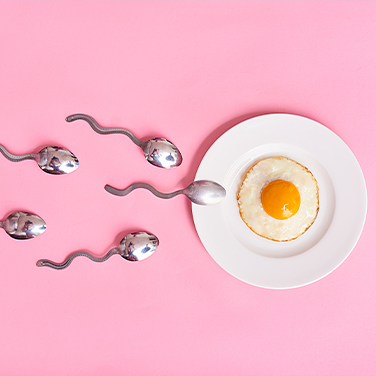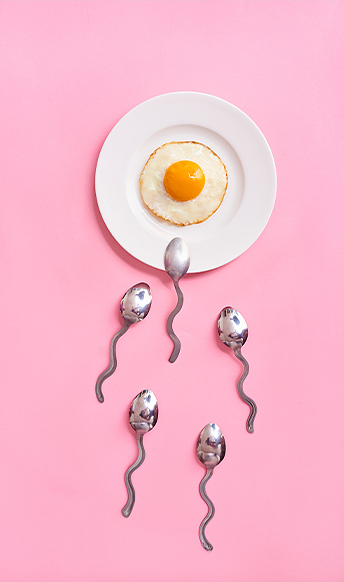Even people who have one will tell you that vaginas are complicated.


FAQs About Your Partner's Vagina: A Visitor's Guide
As you're getting to know your partner's vagina, you're sure to have a lot of questions. Even people who have one will tell you that vaginas are complicated.
Understanding the ins and outs of this amazing organ takes time and attention. So, grab pen and paper and be ready to take notes, because we're about to answer all of your important vagina queries.


A fair question, and one that confuses more people than you might think. The clitoris is the pleasure center of the vulva and includes external and internal sections. However, the part most people consider the clitoris is actually the glans clitoris.
The glans clitoris is pea-shaped and fleshy, and situated above the urethra, right below where the labia meet and form the clitoral hood. This unassuming organ contains half the nerve endings of the entire clitoris—more than 8,000—and is extremely sensitive to touch. For 75 percent of women, clitoral stimulation is required to reach orgasm.
Internal portions of the clitoris extend upward into a woman's pelvis, and backward behind the labia toward the anus. They can be stimulated internally through vaginal and anal sex, and can also help women reach the big O.
For 75 percent of women, clitoral stimulation is required to reach orgasm.

This is a good thing. A vagina that smells is a normal vagina.
Vaginas are their own complex ecosystem, full of natural bacterial flora that thrive off a warm, moist environment. The bacterial flora protects the vagina against harmful bacteria and is responsible for normal vaginal odors. Normal vaginal smells can be tangy, sour, fermented, metallic, bittersweet or bleach-y. If this is what you're smelling, this is completely OK and doesn't mean your partner has bad hygiene or any underlying problem.
Abnormal vaginal odors—fishy, rotten, meaty—may indicate a problem, such as bacterial vaginosis (BV), trichomoniasis or a forgotten tampon.

A vagina that smells is a normal vagina.


There's no reason not to have sex while your partner is menstruating, assuming she's comfortable with it. Cramping, bloating, breast tenderness, headaches, muscle aches and low energy are all common symptoms for women during their period, and therefore, having sex may not sound appealing or be comfortable for every woman.
If you're both up for sex, be aware of the possibility of slightly stained sheets. You can put a towel down or try having sex in the shower. Aspects to consider: sexually transmitted infections (STIs) can still be spread, and while getting pregnant is much less likely during a period, it's still possible if she has a longer period or the bleeding she's noticing isn't actually a normal period and is later in the cycle. For these reasons, you should still use condoms, as well as birth control if you want to prevent pregnancy.

How much fluid the vagina produces varies significantly based on a wide array of factors, such as hormonal swings, fertility status and arousal. Vaginal dryness can be caused by breastfeeding, cigarette smoking, rigorous exercise, extreme stress, depression, immune system disorders, hormone therapies, cancer treatments and more. This condition can also be different from woman to woman, as well as day to day.
Natural lubrication tends to decline during perimenopause, and many women experience vaginal dryness during and after menopause. A good lubricant can do wonders, and everyone should consider using it because it can amp up pleasure and comfort during sex whether a woman's lubrication is an issue or not.
For more extreme vaginal dryness, a doctor can prescribe medications or topical treatments to increase lubrication and comfort during intimacy.

A vagina's tightness has nothing to do with how much sex a woman has had.


Contrary to popular conception, a vagina's tightness has nothing to do with how much sex a woman has had. For the most part, changes in hormone levels throughout a woman's cycle result in alterations in vaginal wetness and elasticity, which can affect comfort during sex and how firm or tight the vagina feels to a partner.
After a woman's period ends, estrogen and progesterone levels begin rising, peaking around ovulation. Women typically have a higher sex drive during this time and produce more vaginal lubrication. The vagina is also more elastic at this point, and being wetter and more flexible can feel less tight to a partner.
After ovulation, hormone levels drop and remain low until after and during menstruation. The vagina will feel dryer and less flexible, which may make it feel tighter. A woman may also feel tighter if she is less aroused or feeling stressed. Decreased estrogen due to menopause can also create the perception of tightness.
Abnormal tightness can be caused by vaginismus and vaginal stenosis, and requires medical evaluation.

Whether you're trying to get pregnant or trying to avoid it, understanding your partner's cycle is the key.
Ovulation is a monthly process that occurs when an ova, or egg, is released by one of the ovaries. The egg moves down the fallopian tube on its way to the uterus, and during this journey, can be fertilized by sperm. Women are most likely to get pregnant during ovulation, as well as the five days leading up to it, the length of time sperm can survive in a woman's body.
For most women, ovulation occurs 12 to 14 days before the start of their next period, and on average, days 10 to 14 of the cycle are the most fertile. A number of methods can help track ovulation, such as an ovulation predictor kit or fertility monitor, which evaluate body temperature or hormones in the urine to identify peak fertility. Physical signs of ovulation include a slight increase in basal body temperature, abdominal cramping, wetter, more slippery vaginal discharge (like egg whites), and increased sex drive.

Vaginas are their own complex ecosystem.









